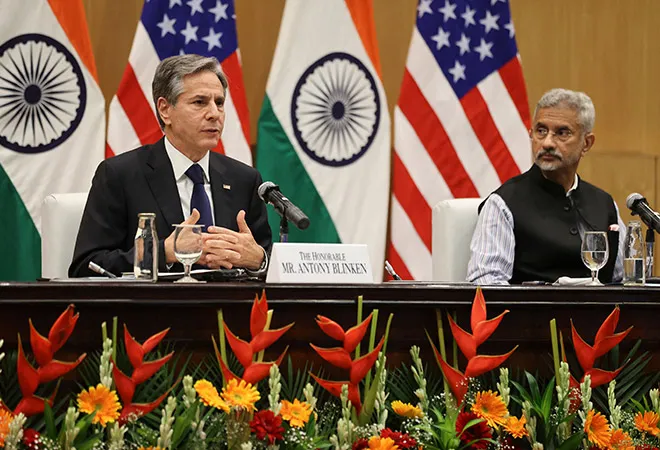-
CENTRES
Progammes & Centres
Location
Despite concerns that the Biden administration’s focus on human rights and democracy would entail sharp criticism of New Delhi, Blinken’s visit highlighted the many areas of bilateral synergy.

U.S. Secretary of State Antony Blinken was just in India on his first trip as secretary of state. During the two-day visit, Blinken had meetings with Indian External Affairs Minister Dr. S. Jaishankar, National Security Advisor Ajit Doval, and Prime Minister Narendra Modi. Battling the COVID-19 pandemic, the situation in Afghanistan, the Quad and Indo-Pacific partnerships were some of the prominently covered themes during the meetings.
Jaishankar, during his remarks prior to their bilateral meeting, highlighted that “our interests are shared, our concerns are similar, and our convergences are strong.”
Blinken, endorsing the strategic partnership, said “there is not a single major challenge that has an impact on the lives of our citizens, whether it’s COVID-19, whether it’s a change in climate, whether it’s the disruptive impact of emerging technologies, that can be addressed by any one of us acting alone … And that is certainly the case with the United States and India.”
Despite concerns on the Indian side, at least among the strategic community, about possible irritants in the India-U.S. bilateral relationship on issues such as human rights, curtailment of religious and media freedoms, and the overall tone of Indian democracy, the visit appears to have gone very well.
Prior to the visit, there were apprehensions on the Indian side because of the U.S. focus on democracy, and the apparent weakening of India’s liberal values. The U.S. has placed democracy and ideology as an important asset in the conflict with China. This has been reciprocated from the Chinese side, giving the emerging Cold War between the two powers an ideological slant. From the start, the Biden administration has talked about organizing a summit of democracies, but specifics have not been laid out as other priorities demand attention.
This is probably for the best. The U.S. will probably find it difficult to be faithful to creating a coalition of liberal democracies. Many of the United States’ actual and potential allies, including in Southeast Asia, are either non-democracies like Vietnam or are countries whose liberal credentials have significantly weakened, such as the Philippines. In addition, the growing domestic disputes in the United States itself suggest that the U.S. may have difficulty in promoting norms of liberal democracy without facing clear charges of hypocrisy.
The other major concern in New Delhi was Washington’s withdrawal from Afghanistan. There appeared not to have been much discussion on this matter, at least on the basis of the statements released in the public, which were limited to boilerplate sentiments about peace and stability in Afghanistan. It is very likely that India briefed the U.S. on India’s moves in the region considering that senior Indian officials visited both Iran and Russia in the last couple of weeks. While there is an ongoing debate within India over whether New Delhi should recognize or talk to the Taliban directly, it is unlikely that it will go very far considering how closely the Taliban is tied to Pakistan’s apron-strings.
It is also likely that Blinken shared the U.S. assessment of the state of the fight and the capacity of Afghanistan government forces to hold the line against the Taliban. But ultimately, while both share an interest in keeping the Taliban out, it is clear that the U.S. is unlikely to do very much other than helping to prop up the government forces. The U.S. is also likely to support India’s efforts at shoring up an anti-Taliban force, even if it includes support from countries like Iran and Russia, with which the U.S. has serious difficulties. Thus, this is a game that is entirely up to India, and not one that will be central to India-U.S. relations.
Other discussions appear to have focused on the COVID-19 pandemic and vaccines, which is not surprising considering the conditions today, but which was probably exaggerated in terms of the importance it has in the India-U.S. context.
Clearly, the fundamentals are strong in the relationship and these fundamentals are being cemented by China’s foolish behavior across the board. Despite the consequences of this behavior, the Chinese leadership seems unwilling or unable to change its approach. As long as that does not happen, there is strong likelihood that India-U.S. relations will continue to grow stronger.
This commentary originally appeared in The Diplomat.
The views expressed above belong to the author(s). ORF research and analyses now available on Telegram! Click here to access our curated content — blogs, longforms and interviews.

Dr Rajeswari (Raji) Pillai Rajagopalan was the Director of the Centre for Security, Strategy and Technology (CSST) at the Observer Research Foundation, New Delhi. Dr ...
Read More +